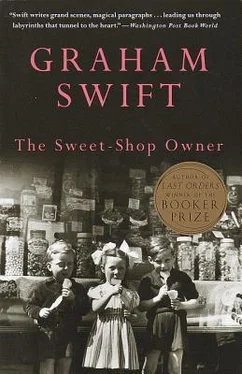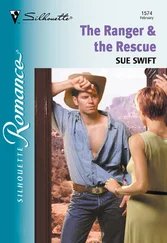Graham Swift - The Sweet-Shop Owner
Здесь есть возможность читать онлайн «Graham Swift - The Sweet-Shop Owner» весь текст электронной книги совершенно бесплатно (целиком полную версию без сокращений). В некоторых случаях можно слушать аудио, скачать через торрент в формате fb2 и присутствует краткое содержание. Год выпуска: 2012, Издательство: Vintage Books USA, Жанр: Современная проза, на английском языке. Описание произведения, (предисловие) а так же отзывы посетителей доступны на портале библиотеки ЛибКат.
- Название:The Sweet-Shop Owner
- Автор:
- Издательство:Vintage Books USA
- Жанр:
- Год:2012
- ISBN:нет данных
- Рейтинг книги:4 / 5. Голосов: 1
-
Избранное:Добавить в избранное
- Отзывы:
-
Ваша оценка:
- 80
- 1
- 2
- 3
- 4
- 5
The Sweet-Shop Owner: краткое содержание, описание и аннотация
Предлагаем к чтению аннотацию, описание, краткое содержание или предисловие (зависит от того, что написал сам автор книги «The Sweet-Shop Owner»). Если вы не нашли необходимую информацию о книге — напишите в комментариях, мы постараемся отыскать её.
The Sweet-Shop Owner — читать онлайн бесплатно полную книгу (весь текст) целиком
Ниже представлен текст книги, разбитый по страницам. Система сохранения места последней прочитанной страницы, позволяет с удобством читать онлайн бесплатно книгу «The Sweet-Shop Owner», без необходимости каждый раз заново искать на чём Вы остановились. Поставьте закладку, и сможете в любой момент перейти на страницу, на которой закончили чтение.
Интервал:
Закладка:
Those holidays. We rented a place where you could only glimpse the sea in the gaps between other houses. We could have afforded more but we’d become thrifty. Gulls perched on the chimney-pots opposite. The rooms smelt of bared skin and calamine lotion, and there were old magazines and crime novels, bits of dried seaweed and a torn shrimp-net left by previous tenants. In the night we could hear each other’s breathing. And what else Dorry? You couldn’t have told, could you, whether those gasps of hers were gasps of pain or joy? But you slept soundly then, full of air and exercise. Your little body was engrossed in its own adventurousness. You raced over the beach and you weren’t afraid (it always surprised me) of the water. Later you became a good swimmer. School swimming galas: winner of the back-stroke, second in the diving. Life-saving. Why did you stop all that? You scurried bravely, as if you had a challenge to make, across the sand and you only checked yourself when you caught her eyes trained upon you. Was it then? When you walked along the top of the breakwater? There were breakwaters at intervals along the beach, high and barnacled, and the uprights of some were only a yard apart and perhaps only nine inches thick. You climbed up on one, where it was low in the sand, above the water-mark, and walked out, not on the horizontal planks, but on the narrow uprights, leaping from one to the next. You knew she was watching you. I saw your head set in defiance, and your legs tremble at the risk (how you needed to run risks) you were taking. But your light limbs carried you through, gingerly, on your toes like a ballerina, over the narrow posts. ‘Dorothy!’ she yelled, getting up from her chair, taking off her glasses. People looked. The uprights were seven or eight feet high out there and the sand beneath was wet and hard. ‘She’ll fall,’ she said. But you didn’t fall, or stop, and only swung yourself down, reluctantly, when the posts became too far apart to attempt. How fragile you seemed walking back across the sand. You saw that look in her eyes, afterwards, as if she wouldn’t acknowledge your daring. And you saw that glance she gave me because I’d stood with my mouth open and done nothing myself (I knew you wouldn’t fall) to rescue you.
How many years did we go to Dorset? ’53, ’54, ’55. We had a holiday every year, though every year she’d say, putting her hand to her throat, ‘Can we afford to leave the shop?’ Afford? Later we ventured further afield: Lyme Regis, Padstow, Teignmouth. But we had the car then. The Morris Oxford. We bought it when you were seven or eight; and only for you; so that we could take you out for rides and educational visits. Sunday outings to the country (I did only the papers on Sundays then). Picnics by the Thames and on Box Hill, on which she would come as if under constraint, sitting in the car while we got out the basket and the blanket to spread on the grass. After a while she’d sometimes say, ‘No, you go; I’ll stay here, I don’t mind.’ You saw how it hurt me to leave her, how I worried about her all day, so that it was never exactly fun we had by ourselves. And then, one day, she ceased to come out at all; and you spent your week-ends reading, timidly studying for exams, and I opened the shop all day Sundays. I only used the car to drive to work (I never did at first — I used to like that walk over the common — but it became hard, lugging my lame leg up the hill). Lyme Regis, Padstow, Teignmouth. They were the only holidays we had. And then you went — you must have been fourteen — on the school trip to Venice, and then again to Greece. History, art; guide-books from St Mark’s and the Parthenon. Neither she nor I had been abroad. Yet we paid for those trips for you. And then you holidayed by yourself (though she said you were too young), with school friends; coming back home and telling us nothing of what you’d done. But by that time she was turned fifty. How quickly. She had to visit the hospital, and the doctor said her heart, too, was weak. And I was fifty-one. And at fifteen there was already a gravity in your face.
Holidays. Holidays.
18
The telephone was ringing on the little shelf next to the doorway into the stock room. Above it, on the wall, was the list of vital telephone numbers (St Helen’s Hospital had been crossed out, but it was still the same list) and next to it, fixed with Sellotape, the postcards from Mrs Cooper’s more leisured friends. Torquay and San Remo, in predominant blue. ‘I’ll get it,’ said Mrs Cooper, as he began to raise himself from his stool by the fridge. The sun had moved round so that the awning obscured it, but a shaft penetrated inwards from a corner of the window. It fell fully on her face at the phone; but her skin was pale and chill-looking. She stepped back, holding a hand over the mouth-piece, deliberately jostling Sandra at the paper counter — who, in Mrs Cooper’s view, was not worthy enough to answer the phone.
‘It’s Pond Street, Mr Chapman. They say they don’t have the usual orders for Callard’s and Fry’s. Have you forgotten them’ (she hesitated — Mr Chapman never forgot) — ‘or have you got them here?’
‘No, that’s fine Mrs Cooper. I didn’t make those orders.’
‘Didn’t —?’ She looked momentarily flummoxed at this unprecedented lapse. ‘Didn’t — But what shall I —? Here, are you all right, Mr Chapman?’
He was looking straight at her, but as if he didn’t see her. His fingers gripped the rim of the fridge.
‘Tell them,’ he said, as if forcing aside a distraction, ‘I’ll explain when I bring their money round. And tell them that might be a little later this afternoon.’
She paused, raised a puzzled eyebrow, but turned back to the phone. As she spoke she glanced at him, then at the blue postcards above the shelf.
*
‘Please come in, Mrs Cooper.’ He twisted the sign from ‘Open’ to ‘Closed’ and bolted the door on the inside, on a damp September evening in 1958. And there she was in a blue twin-set, putting a face to the letter she’d written, sitting behind the counter, brushing imaginary specks from her knee.
‘I’m sorry it had to be this late, but I couldn’t show you the ropes with customers coming in.’
‘Oh, no trouble Mr Chapman.’
Her hair was fair, still thick, and the beak-like nose and straining throat less prominent amidst a general plumpness.
‘Now let me show you what’s what …’
And so he’d explained, extending an outspread hand to the four corners of the shop, with an air, perhaps, of proprietorial pride. For they’d swelled and multiplied, those items to which he gestured. The coloured wrappers had thickened and brightened, like synthetic fruit on the wooden shelves; the trellis-work of racks and cardboard displays flourished. A new till and scales stood on the counter. And, outside, bright new blue paint, a large new name-board and a clutter of signs, some of them lit at night, adhering to or projecting from the walls, made it seem that the treasures within had spilled out onto the pavement.
And yet it wasn’t pride, now that he addressed his first ever employee, so much as an urge not to waver from the role expected of him, that made him sweep his hands so grandly.
She followed him, assessing him behind her smile.
‘Up till now, Mrs Cooper, I’ve managed pretty well by myself. But it’s my wife. Er, she’s not well, she has to visit the hospital, and there may be times when I’ll need to be able to leave the shop. This’ll mean, of course, that now and then you’ll be left in charge yourself.’
‘Oh’ — a warmer glint came into her eyes — ‘I’ll manage. It’s nothing serious I hope?’
‘Asthma. With complications.’
Her gaze drifted over the shelves and the counter with the new till. There were none of the gobbling vulture looks in that rounder profile, and yet there was something un-nerving about her dcsire to please.
Читать дальшеИнтервал:
Закладка:
Похожие книги на «The Sweet-Shop Owner»
Представляем Вашему вниманию похожие книги на «The Sweet-Shop Owner» списком для выбора. Мы отобрали схожую по названию и смыслу литературу в надежде предоставить читателям больше вариантов отыскать новые, интересные, ещё непрочитанные произведения.
Обсуждение, отзывы о книге «The Sweet-Shop Owner» и просто собственные мнения читателей. Оставьте ваши комментарии, напишите, что Вы думаете о произведении, его смысле или главных героях. Укажите что конкретно понравилось, а что нет, и почему Вы так считаете.












